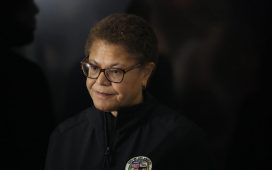Nio has already had one near-death experience.
Carmaking is typically a capital-intensive business, but with Nio, Li has sought to create a brand beyond the vehicles, an approach he describes as “the pursuit of being a user-enterprise.’’ The most visible manifestation of that was the Nio House, an elite drop-in center for the company’s customers — even offering art and music classes for their kids — and located on prime real estate in some of China’s biggest cities. It was coupled with extravagant marketing events. The carmaker holds annual Nio Days, and at the first in 2017 paid for flights and luxury hotels for everyone who ordered a vehicle a year before production started. R&B star Bruno Mars headlined the 2018 event. When its public charging facilities are overwhelmed, Nio has a fleet of cars that can take portable battery chargers to users wherever they’re parked.
Such largesse, along with a major recall after some cars caught fire just as China shifted subsidies from EV purchases to support the charging network, saw Nio rack up $5 billion of losses in its first four years of existence (Tesla took about 15 years to reach that particular milestone). By the second quarter of 2019, the company was losing around $5 million a day.
“It was our darkest time,’’ Li said. A team met nightly to comb through expenses, from salaries to the cost of Nio Houses. “It was easy to calculate how much we could earn from selling cars, but we had to mind for everything to sustain a normal operation,’’ he said. “Every dollar counted.”
By October 2019, it looked like the gig was up. After posting a worse-than-expected quarterly loss, Nio’s shares plunged to a record low of $1.32. At its nadir, the carmaker had lost more than 70 percent of its market capitalization — about $5 billion in value — from its New York initial public offering a year earlier.
Even a $200 million cash injection from a sale of convertible notes to Li and an affiliate of Chinese tech giant Tencent Holdings Ltd. — an early investor in both Nio and Tesla — wasn’t enough to shore up the company’s seemingly insatiable need for cash.
The setbacks kept coming. Nio couldn’t afford the final payment on an imported stamping presser, a large machine used to shape a car’s panels. Worse, it had to sell the presser at a discount to Tesla, which promptly installed it in its new Shanghai plant, built with loans and support facilitated by the government. Soon after, a deal for as much as 10 billion yuan ($1.6 billion) in funding from a Beijing local government-backed firm fell apart. Analysts started to openly speculate that Nio may be delisted or taken over. The situation got so dire that in late 2019, He Xiaopeng, the engineer founder of Guangzhou-based Xpeng, itself in a tenuous position with just 3 billion yuan in cash, proposed a merger of the two struggling electric carmakers, according to an interview He gave to Chinese state media. Li rejected the offer.
“Nio was already in the intensive care unit, while Xpeng was waiting outside,’’ Li recalled. “A merger would bury both of us.”
(Xpeng went on to be the third Chinese EV startup to list in the U.S., raising $1.5 billion in August 2020. The surge of investment in the space has seen its shares more than double, even accounting for a recent dip, and the company is now setting up a third Chinese production base to meet demand.)
Then came the lifeline that showed the lengths China will go to maintain its ambition of creating a world-leading EV industry.
In early 2020, the municipal government in Hefei — the capital of Li’s home province of Anhui, about 600 miles southeast of Beijing — came knocking. Despite the onset of the coronavirus pandemic, which initially paralyzed car sales, a deal was struck in which the Hefei government would lead an injection of 10 billion yuan into Nio, more than the company’s entire revenue for 2019.
Coming just months after Nio said it wouldn’t have enough money to continue operating for another year unless it got more funds, the agreement essentially provided the company with a state-backed security blanket. That can be a key advantage in China, where the government is the biggest player in almost every industry and has a hand in everything from manufacturing permits to access to capital. It could also provide a decisive edge over Tesla, which seems to have lost the favor it enjoyed early on with Beijing, as tensions with Washington continue to simmer under President Joe Biden’s administration.
For Nio, the quid pro quo was supporting local industry. The company abandoned plans to build a factory in Shanghai in early 2019, and instead — unlike Tesla and most traditional automakers — it pays a government-owned manufacturer in Hefei called Jianghuai Automobile Group Co., or JAC, to make its cars. The deal was extended last month for another three years, with JAC agreeing to double monthly capacity to 20,000 vehicles.
“When William Li brought his proposal to us, most people thought it was fantasy that a Chinese carmaker planned to build first-rate intelligent electric vehicles,’’ former JAC Chairman An Jin said. “I might be the person with the best knowledge of how Nio came along, with all the challenges and difficulties. In its hardest time, William even devoted his own money to solve the problem. That’s how he fought for his dreams.’’







